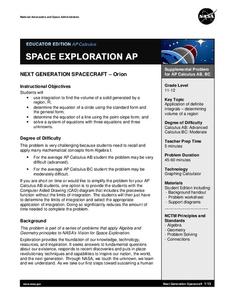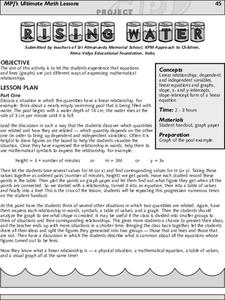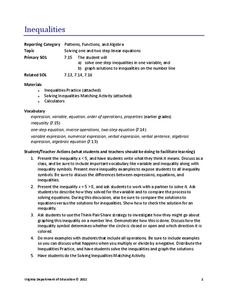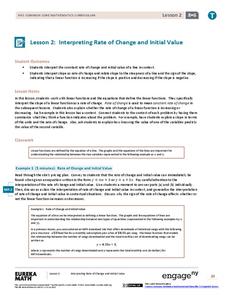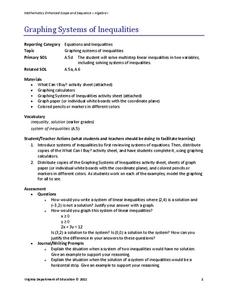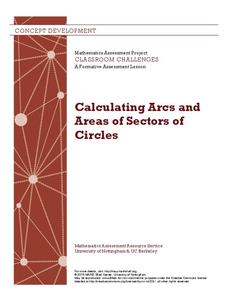Curated OER
Cutting Cordwood
Students examine a story problem in which two men are earning money by cutting cords of wood. They use data from graphs to use on a grid. They practice writing algebraic equations as well.
Curated OER
Translation and Rotation of Axes
Students rotate axes to eliminate the xy-term and illustrate the dissectible cone as needed. They also discuss the discriminant for the second degree equation in two variables, as well as the translation of axes and rotation of axes....
Curated OER
Representing the Unknown
Second graders solve number sentences and examine how to apply basic operations of mathematics to those problems. They also use symbols to represent unknown numbers and how they are used in equations.
Curated OER
Still More Lollies
Fourth graders listen to the problem to the class and think about how they solve the problem and to discuss it with their friends using number sentences in their written record of the solution.
Curated OER
Newton's Earthquake
Students discuss Newton's 2nd and 3rd laws using the example of a football linebacker and a small child pushing against each other on an ice rink. Students are able to visualize the results of the push and link it to the laws. Discussion...
Curated OER
The Pythagorean Theorem Lesson 2
Learners discuss and review examples of the Pythagorean Theorem using a GSP, Geometer's Sketchpad, activity.
Curated OER
Solving Inequalities By Using Addition And Subtraction
Seventh graders solve inequalities using addition and subtraction. They write number sentences based on word problems.
Curated OER
Statistical Pictures of School and Life
Students explore how mathematical data is used to summarize and illustrate everyday life. They apply mathematical concepts and skills to analyze data. Students conduct a five question survey of 50 people or more and graph the data.
Curated OER
Cuisenaire Rods And Math
Students find the least common multiple of several given numbers using Cuisenaire rods. Previously taught math skills are reinforced by using Cuisenaire rod games, puzzles and or activities.
Curated OER
NEXT GENERATION SPACECRAFT-Orion
Students investigate the volume of a solid. For this calculus lesson, students use integration to find the volume of a solid generated by a region, the Orion crew module.
Discovery Education
Sonar & Echolocation
A well-designed, comprehensive, and attractive slide show supports direct instruction on how sonar and echolocation work. Contained within the slides are links to interactive websites and instructions for using apps on a mobile device to...
NTTI
Line 'Em Up!
Coordinate planes and Cartesian graphing systems are the focus of this math lesson. Learners use video, internet activities, and engage in hands-on activities in order to explore coordinate planes. The materials needed for this lesson...
West Contra Costa Unified School District
Standard Form of Conics
Looking for a complete go-to guide for the standard form of conics? This five-page packet does a nice job of connecting conics to prior knowledge of functions and transformations. Adapt the resource as Algebra II lesson plan...
Sri Atmananda Memorial School
Rising Water
An engaging, and not to mention attractive, lesson plan has prealgebra and beginning algebra scholars examining linear relationships. They consider the rising water level as a swimming pool is being filled. They do so by charting and...
Virginia Department of Education
The Rate of a Chemical Reaction
If your pupils think a catalyst is a list of their cats, then this might be the lesson for you! Young chemists study the effect of temperature, catalysts, concentration, and particle size on reaction rates during four different...
Virginia Department of Education
A Crystal Lab
Young chemists grow ionic crystals, metallic crystals, and supersaturated crystals in three different lab experiments. Observing these under a microscope allows pupils to compare the various structures.
CPM
Direct, Joint, and Inverse Variation
Here is a quick guide to direct, joint, and inverse variation used in realistic situations. Each topic has a page of notes and examples followed by practice problems. The resource explains each type of variation and provides their...
Virginia Department of Education
Inequalities
Not all resources are created equal — and your class benefits! Scholars learn how to solve one-step inequalities using inverse operations. They complete an activity matching inequalities to their solutions.
EngageNY
Interpreting Rate of Change and Initial Value
Building on knowledge from the previous activity, the second activity in this unit teaches scholars to identify and interpret rate of change and initial value of a linear function in context. They investigate how slope expresses the...
Willow Tree
Number Properties
The number of basic algebraic properties can become overwhelming for learners. A lesson explains and gives examples for all the basic algebraic properties. The resource is perfect to use as a way for pupils to organize and...
Alabama Learning Exchange
Classifying Complex Numbers
Imaginary numbers are a real thing. Scholars learn about complex numbers, real numbers, and imaginary numbers. They classify given numbers as strictly complex, strictly real, or strictly imaginary in an individual or group activity.
Virginia Department of Education
Graphing Systems of Inequalities
Apply systems of inequalities to a real-world problem. Here, scholars learn to graph solutions to systems of linear inequalities. To finish the lesson, they solve a problem involving burgers and cheeseburgers using a system of inequalities.
Mathematics Assessment Project
Calculating Arcs and Areas of Sectors of Circles
Going around in circles trying to find a resource on sectors of circles? Here is an activity where pupils first complete an assessment task to determine the areas and perimeters of sectors of circles. They then participate in an...
Virginia Department of Education
Acid-Base Theory
Litmus paper, why so blue? A chemistry lesson plan includes a pre-lab activity, practice calculating pH, an experiment measuring the pH in acids and bases, a titration demonstration, and a titration experiment.









